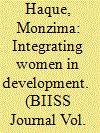| Srl | Item |
| 1 |
ID:
140303


|
|
|
|
|
| Summary/Abstract |
The global movement for the recognition of women’s rights as human rights attempted to identify those rights crucial to the well being of women. The Universal Declaration of Human Rights (1948) and other subsequent assertion of equal rights to men and women in spite of their sexual identity are very crucial in this regard. Conventional wisdom suggests that the progress towards equality for men and women has not been satisfactory in developing countries like Bangladesh where women are subject to exclusion as a result of the ‘socialeconomic-political’ as well as ideological privileges of men evident in the patriarchal structure of the society. The paper argues that although women’s presence and participation in the development process of Bangladesh have not been adequate, the initiatives at various levels to address this inadequacy and progressive movements of women in diverse sectors of Bangladesh have brought in a number of affirmative changes. With this aim, the paper attempts to review the current status of women in the political, economic and social development of the country and examines the strengths and limitations of integration of women in mainstream development structure.
|
|
|
|
|
|
|
|
|
|
|
|
|
|
|
|
| 2 |
ID:
179573


|
|
|
|
|
| Summary/Abstract |
A majority of the existing narratives on studying civil society in India are flooded with empirical findings, without much emphasis on theoretical understanding of the subject. Thus, the article tries to provide a historical overview of the development of notion of civil society and its research in “uncivil” Indian tradition from different dominant theoretical angles in the field. After finding their limitations, the study attempts to provide an alternative understanding of emergence of civil society in colonial India. It also aims to explore, how the lineage of traditional inform civic assocciationalism combined with modern institutionalized associational space gave birth to liberal-minded individuals and the conscious public in colonial India. Moreover, the present research further reveals that how civic awareness inculcated among the marginal’s along with the educated Indian middle class and how interactions between the state, society, and religion helped in development of spirit of civility among individuals, awareness among the public and voice of protest among community in “uncivil” colonial India which was unique from its western counterpart both in the process of formation and the forms of manifestations.
|
|
|
|
|
|
|
|
|
|
|
|
|
|
|
|